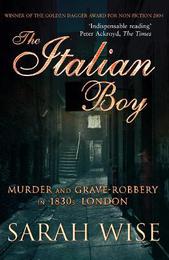
|
The Italian Boy: Murder and Grave-Robbery in 1830s London
Paperback / softback
Main Details
| Title |
The Italian Boy: Murder and Grave-Robbery in 1830s London
|
| Authors and Contributors |
By (author) Sarah Wise
|
| Physical Properties |
| Format:Paperback / softback | | Pages:368 | | Dimensions(mm): Height 198,Width 129 |
|
| Category/Genre | True Crime
British and Irish History |
|---|
| ISBN/Barcode |
9781844133307
|
| Classifications | Dewey:942.1075 |
|---|
| Audience | |
|---|
| Illustrations |
80
|
|
Publishing Details |
| Publisher |
Vintage Publishing
|
| Imprint |
Pimlico
|
| Publication Date |
5 May 2005 |
| Publication Country |
United Kingdom
|
Description
Towards the end of 1831, the authorities unearthed a series of crimes at Number 3, Nova Scotia Gardens in East London that appeared to echo the notorious Burke and Hare killings in Edinburgh three years earlier. After a long investigation, three bodysnatchers were put on trial for supplying the anatomy schools of London with suspiciously fresh bodies for dissection. They later became known as The London Burkers, and their story was dubbed 'The Italian Boy' case. The furore which led directly to the passing of controversial legislation which marked the beginning of the end of body snatching in Britain. The case revealed some extremely unpleasant aspects of life in London, a city that had increased in size by one-third - to over one-and-a-half million inhabitants - between 1801 and 1831, and which was continuing to expand at a phenomenal and unprecedented rate. In The Italian Boy, Sarah Wise not only investigates the case of the London Burkers but also, by making use of an incredibly rich archival store, the lives of ordinary lower-class Londoners. She shows how the case challenged their notions of community and criminality, and how it made many feel that at the heart of their great city lay unknown, unknowable mysteries. Here is a window on the lives of the poor - a window which is opaque in places, shattered in others but which provides an unprecedented view of low-life London in the 1830s.
Author Biography
Sarah Wise has an MA in Victorian Studies from Birkbeck College. She teaches 19th-century social history and literature to both undergraduates and adult learners, and is visiting professor at the University of California's London Study Center, and a guest lecturer at City University. Her interests are London/urban history, working-class history, medical history, psychogeography, 19th-century literature and reportage. Her website is www.sarahwise.co.uk Her most recent book, Inconvenient People: Lunacy, Liberty and the Mad-Doctors in Victorian England (Bodley Head), was shortlisted for the Wellcome Book Prize 2014. Her 2004 debut, The Italian Boy: Murder and Grave Robbery in 1830s London (Jonathan Cape), was shortlisted for the 2005 Samuel Johnson Prize for Non-Fiction. Her follow-up The Blackest Streets: The Life and Death of a Victorian Slum was published in 2008 and was shortlisted for the Royal Society of Literature's Ondaatje Prize. Sarah was a major contributor to Iain Sinclair's compendium London, City of Disappearances (2006). She has contributed to the TLS, History Today, BBC History magazine, the Literary Review, the FT and the Daily Telegraph. She discussed bodysnatching for BBC2's History Cold Case series; provided background material for BBC1's Secret History of Our Streets; and spoke about Broadmoor Hospital on Channel 5's programme on that institution.She has been a guest on Radio 4's All in the Mind, Radio 3's Night Waves and the Guardian's Books Podcast about 19th-century mental health.
ReviewsColourful without being sensationalist, the result is compelling -- Andrew Holgate * Sunday Times * Brilliant -- Christopher Hirst * Independent * Excellent...an impressively strong sense of 19th-century poverty seems to ooze from its pages and the details are fascinating -- Toby Clements * Daily Telegraph * Engrossing...Wise exposes an entire "resurrection community" in London's underworld and shows how "The Italian Boy case" captured the public imagination -- Ian Pindar * Guardian * A work of great skill and sympathy -- Peter Ackroyd * The Times *
|